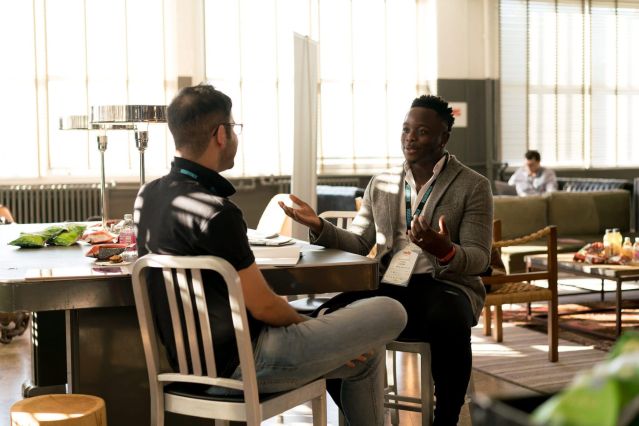KEY POINTS-
- Our minds aren’t passive observers, simply perceiving reality as it is. Our minds actually change reality.
- Put yourself in a position of trust with another to truly help bring out the best outcome for the person.
- Stop, pause, and reflect to open space for a different conversation.
- Earn the trust of the other by truly understanding, empathizing, and reflecting their situation.
A landmark Stanford University study in the neuroscience of human behavior found that a human being can have around 60,000 thoughts per day, and 90% of these are repetitive. These thoughts can contain a mixture of negative, positive, and inquisitive thoughts. “Our minds aren’t passive observers, simply perceiving reality as it is. Our minds actually change reality," reported Alia Crum, an Assistant Professor of Psychology and Director of the Stanford Mind and Body Lab. This research begs the question for us; could that process really be operating for me in my life? Of course not, after all, I am an inquisitive and open-minded person who listens and responds in the moment, right? I never bring my bias into a conversation or situation.

Several weeks ago, a man in his late 40s emailed me and asked if I would meet him at the local coffee shop in town. He implied that, knowing my background, he wanted to explore some things he has been wrestling with in his life. I did know of him and even had met him casually over the years. I love a good conversation and always hope that I can help, and I also love coffee and coffee talks. I didn’t know what to expect but was excited to meet a new friend in town.
I am a 30-plus-year organization consultant and have advanced degrees in counseling psychology and organizational psychology (Ph.D.), and I regularly coach and counsel CEOs and executives on a variety of personal and work-related issues. However, what I/we experienced that morning at Monte’s Café was quite unusual and hopefully instructive for all of us to consider when thinking and learning about how to best provide help, guidance, coaching, or whatever you may want to call it for another.
Let me share what happened in that 1.5 hours of our initial meeting, what I was experiencing inside of this event, what I said and did, and what ultimately happened. After that, we can take a look from a meta-perspective about what we can learn from this about how to put yourself in a position of trust with another to truly help bring out the best outcome for the person.
I am calling this a “different conversation” for two reasons; first, because the conversation was different than I expected, and second, because I am suggesting that to truly help another requires us to have a different conversation with ourselves than the usual 90% same thoughts and perspective that the Stanford University study outlined at the start of this article.
Within two minutes my friend, let’s call him Mark, shared such clear, totally intimate, and provocative feelings and thoughts/questions with me that each of us had tears in our eyes. I was so taken by his vulnerability, transparency, and trust in this interaction that it gave me great pause, and I can remember thinking to myself as I was one foot away from his eyes, both of us leaning in, that I knew the stakes were high for him and that this was indeed a sacred moment and I was being called to help him. I would have to stop, pause, and reflect, while I was intently listening to him to be sure that I was responding from my highest and most skillful self.
Our usual mode of responding, if we didn’t take pause, might be to fill the space, ask yes or no questions, tell stories about how I had experienced the same thing, get on a soapbox and teach how to address these issues, and even coming up with a to-do list for the other person to complete. All of these have good intent, but, lack the correct timing and sensitivity to respond in a skillful manner, I believe.
What I did do, after my inner pause and reflection, was the following: I took a deep breath, shed tears with him, opened my heart to him, really, and became first and foremost a witness to his pain and challenge. It was as close as I can get to what I think is true empathy, if that is really possible. I attempted to hold space for him to share, reflect his true meaning and possible feelings, and stay with his timing, not mine. The image I am holding is getting on the same side of the issues he was dealing with, looking at them together, arms locked and seeing them in a bundle ten feet away from us.
Only after we both felt we had exhausted the sharing and understanding part of the interaction did I try to summarize what was said and where he was, and then carefully ask if we might move the conversation toward a few exploratory open questions I had for us, and further normalize his situation and even start to suggest some paths that he could, and I would be happy to help him, explore together.
The meeting ended with a hug, and I knew that we had experienced something that is unusual in general but very unusual for two men for a first-time meeting. There was something in him, his situation, and my presence or perspective that allowed this space to be opened and for this trust and vulnerability on both our parts to happen. I know I was profoundly changed by this interaction. Mark and I have met three other times to continue to share and explore both our situations and challenges together and I would now, two months later, consider him a true friend —a much different and deeper friend than 90% of my other friends because of that experience.
The mantra that I wish to offer the reader is to take pause in situations like this that present themselves to you and ask two questions: First, “How can I be most helpful to this person in this moment”, to keep the spotlight on them, not turn it to me. And second, “How can I get out of my own autobiographical script and feelings/ego to put myself in a position to earn the trust of the other by truly understanding, empathizing and reflecting their situation? Ultimately, this is an opportunity to do so, and there can be no greater good than that in our world.


